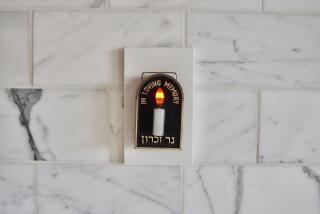Each New Year’s Day Rejuvenates Old Memories of Papa
- Share via
“Happy New Year,” someone said.
A hollow greeting, but its impact ran deep. It was Jan. 1, 1943. I was in an Arizona internment camp, my parents and siblings in similar detention in Wyoming. We had been separated in the confusion of the mass evacuation of people of Japanese ancestry from the West Coast during World War II. For seven months, I had been trying to join my family, but in vain.
This was my first New Year’s Day without family, without feast, and since the time I left home in California, it was the time I missed Papa the most. I had often longed for the warmth of Mama’s love and for the give-and-take exchange with my sisters and brothers, but, on this cheerless New Year’s Day, memories of Papa leaped to mind. In a place of no tomorrow, I found comfort in yesterday.
New Year’s was Papa’s special day. Most of the time, his role was that of authority figure and provider. A stern disciplinarian with a quick temper, he kept us in line. But at year’s end, he seemed to become a different person, more lighthearted and mellow.
A farmer, he labored from sunup to sundown. He nurtured the land; Mama nurtured the children. Emotionally, he was detached from us except around New Year’s. We saw more of him than usual when winter halted the crops and the days became shorter.
As the old year ended, he busied himself in different ways. He involved us in getting the house in order, made repairs that had been neglected and sat down to settle his debts. Papa wanted to be free of all encumbrances, not only financial but social. If he had any misunderstandings with neighbors or friends, he undertook to resolve them. Little wonder that he was light of heart--and wallet--on New Year’s Day.
Each Dec. 31, his mandate to us in Japanese was: “Tonight, you must cleanse yourselves of this year’s grime. Tomorrow, you must start clean and fresh.”
He spoke symbolically, of course, but we knew that a thorough bath was an important part of his ritual. Because there were seven of us and one tub, we usually soaped and rinsed off quickly. Soaking leisurely was a rare luxury. The hot water kept running out so the baths took up most of New Year’s Eve.
The next morning, we awoke to the aroma of ozoni , a hot broth with rice-based mochi that Mama prepared only for New Year’s.
Papa drove off about noon to make the rounds from one friend’s house to another’s, toasting in the new year with warm sake . The women and girls stayed at home to serve the rice wine and delicacies to the male visitors. That was tradition.
Toward evening, Papa would come staggering home. One year, he and his Model A ended up in an irrigation ditch.
Too much tradition.
Now, hundreds of miles away from him and sitting in the camp mess hall with a bowl of corn flakes before me, I wondered how Papa was spending the day. Was he also reminiscing about holidays past?
Now, he, Mama and the other children were housed and fed by the government. Robbed of his pride and responsibilities, no longer the provider and head of his household, what did he have left?
I found out six weeks later when my request for transfer from the Arizona to the Wyoming camp was finally approved, making it possible for me to join my family.
Papa had changed.
When I had last seen him, he was a strapping man, muscles honed by work. His skin was deeply tanned and unwrinkled, his hair still jet black.
In less than a year, his hair had turned white, his face pallid and his body flabby from lack of exercise. He looked beaten and withdrawn. After a few days with the family, I began to understand what had happened.
Papa’s job in camp was kitchen helper, doing chores he had once labeled “woman’s work.” He was considered too old to farm the land. The man who had planted and harvested acres of potatoes was now relegated to peeling them.
Other fathers too lost their place of importance in the family when their wives and children no longer depended on them for food and shelter. The family structure as we had known it had broken down.
When we were released, my family relocated to New York. We returned to California in the 1950s but our friends had scattered and the old traditions had faded away.
Papa never regained his sense of self. For the rest of his life, he was a shadowy figure in the background at family functions. He died in 1968.
But today, at this time of year, the image of Papa, proud and happy on New Year’s Day, comes alive again.
More to Read
Sign up for Essential California
The most important California stories and recommendations in your inbox every morning.
You may occasionally receive promotional content from the Los Angeles Times.













